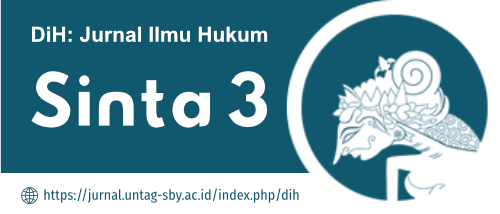MENGKAJI SISTEM HUKUM INDONESIA (Kajian Perbandingan Dengan Sistem Hukum Lainnya)
DOI:
https://doi.org/10.30996/dih.v12i24.2244Keywords:
sistem hukum, sistem hukum pancasila, dan prismatikAbstract
Cara berhukum setiap masyarakat memiliki ciri dan karakter khas masing-masing. Cara berhukum tersebut melahirkan tradisi atau sistem hukum yang berbeda, seperti sistem eropa kontinental, anglo saxon sistem hukum Pancasila. Sistem eropa kontinental menjadikan aturan tertulis yang terkodifikasi secara sistematik sebagai sumber primer, sedangkan sistem anglo saxon menempatkan putusan hakim sebagai sumber primernya. Sistem hukum Pancasila bersifat prismatik yakni sistem yang memadukan semua hal yang baik-baik dari semua sistem yang ada. Sistem hukum Pancasila merupakan peleburan yang baik-baik dari beberapa sistem, baik eropa kontinental, anglo saxon, dan sistem lainnya.
Downloads
References
Balai Pusat Statistik Kabupaten Jombang Jawa Timur, (2015), Jombang Dalam Angka 2015
Meter, Donal, Van and Carl E. Van Horn. The Policy Implementation Process. Sage Publication: Beverly Hill.
Joseph Dainow, The Civil Law and The Common Law: Some Points of Comparison, The Americal Journal of Comparative Law, Vol. 15, No. 3 (1966-1967).
Martin Kryger, Law as Tradition, Journal of Law and Philosophy, Vol. 5 No. 2 August 1986.
Moh. Mahfud MD, Politik Hukum Dalam PERDA Berbasis Syariah, Jurnal Quia Iustum, Volume 14 Nomor 1, 2007.
Vincy Fon and Fransico Parisi, Judicial Precedent in Civil Law System: A dynamic Analysis, International Review of Law and Economics, (2006).
Downloads
Published
Issue
Section
License
Authors who publish with DiH: Jurnal Ilmu Hukum agree to the following terms:
- Authors transfer the copyright and grant the journal right of first publication with the work simultaneously licensed under a CC BY-SA 4.0 that allows others to share the work with an acknowledgement of the work's authorship and initial publication in this journal.
- Authors are able to enter into separate, additional contractual arrangements for the non-exclusive distribution of the journal's published version of the work (e.g., post it to an institutional repository or publish it in a book), with an acknowledgement of its initial publication in this journal.
- Authors are permitted and encouraged to post their work online (e.g., in institutional repositories or on their website) prior to and during the submission process, as it can lead to productive exchanges, as well as earlier and greater citation of published work (See The Effect of Open Access)










